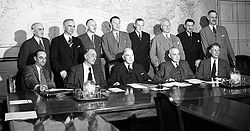
Frederick Gordon Bradley
Encyclopedia
Frederick Gordon Bradley, PC
, QC
(March 21, 1886 – March 30, 1966) was a Canadian
and Dominion of Newfoundland
politician.
and was called to the bar in 1915. Later he started his own law practice.
, he was elected to the House of Assembly
representing the electoral district of Port de Grave. A Conservative
, he was a Minister without Portfolio
in the cabinet of Walter Stanley Monroe
until he resigned from the caucus in 1926 to site as an Independent. He was re-elected in 1928 representing the electoral district of Trinity Centre. A Liberal
, he was a Minister without Portfolio and Solicitor-General in the cabinet of Richard Squires
. Re-elected in 1932, as only one of two Liberals, he was the leader of the opposition. An opponent of the creation of the Commission of Government
, he returned to his law practice in 1933.
. After the death of Cyril J. Fox
he became the chairman.
 The Ottawa Delegation negotiated terms of union for Confederation between Newfoundland and Canada in 1947. Its members (With their districts) were:
The Ottawa Delegation negotiated terms of union for Confederation between Newfoundland and Canada in 1947. Its members (With their districts) were:
The negotiations were largely a one way affair. Any union with Canada was dictated by the British North America Act (BNA), under which Canada had come into being in 1867.
, he was appointed Secretary of State of Canada by Liberal
Prime Minister Louis St. Laurent, making him the first Canadian federal cabinet minister from Newfoundland. He was elected to the Canadian House of Commons
representing the riding of Bonavista—Twillingate
in the 1949 federal election
. In 1953, he was called to the Canadian Senate
representing the senatorial division of Bonavista-Twillingate, Newfoundland and Labrador. He died in office in 1966.
Queen's Privy Council for Canada
The Queen's Privy Council for Canada ), sometimes called Her Majesty's Privy Council for Canada or simply the Privy Council, is the full group of personal consultants to the monarch of Canada on state and constitutional affairs, though responsible government requires the sovereign or her viceroy,...
, QC
Queen's Counsel
Queen's Counsel , known as King's Counsel during the reign of a male sovereign, are lawyers appointed by letters patent to be one of Her [or His] Majesty's Counsel learned in the law...
(March 21, 1886 – March 30, 1966) was a Canadian
Canada
Canada is a North American country consisting of ten provinces and three territories. Located in the northern part of the continent, it extends from the Atlantic Ocean in the east to the Pacific Ocean in the west, and northward into the Arctic Ocean...
and Dominion of Newfoundland
Dominion of Newfoundland
The Dominion of Newfoundland was a British Dominion from 1907 to 1949 . The Dominion of Newfoundland was situated in northeastern North America along the Atlantic coast and comprised the island of Newfoundland and Labrador on the continental mainland...
politician.
Education and employment
Bradley became the principal of the Methodist School in Bonavista after finishing his education at Methodist College in 1906. Three years later, he studied law at Dalhousie UniversityDalhousie University
Dalhousie University is a public research university located in Halifax, Nova Scotia, Canada. The university comprises eleven faculties including Schulich School of Law and Dalhousie University Faculty of Medicine. It also includes the faculties of architecture, planning and engineering located at...
and was called to the bar in 1915. Later he started his own law practice.
Politics
In 1924General elections in Newfoundland (pre-Confederation)
Newfoundland, as a British colony and dominion, held 29 general elections for its 28 Newfoundland House of Assemblies. In 1934 the Dominion of Newfoundland surrendered its constitution to the Crown and ceased to have a legislature in order to be ruled by London through the Commission of...
, he was elected to the House of Assembly
Newfoundland and Labrador House of Assembly
The Newfoundland and Labrador House of Assembly is one of two components of the General Assembly of Newfoundland and Labrador, the other being the Lieutenant-Governor of Newfoundland and Labrador. The Newfoundland and Labrador General Assembly meets in the Confederation Building at St...
representing the electoral district of Port de Grave. A Conservative
Conservative parties in Newfoundland (pre-Confederation)
For the modern Conservative Party see Progressive Conservative Party of Newfoundland and LabradorThe Conservative Party of Newfoundland was a political party in the Dominion of Newfoundland prior to confederation with Canada in 1949....
, he was a Minister without Portfolio
Minister without Portfolio
A minister without portfolio is either a government minister with no specific responsibilities or a minister that does not head a particular ministry...
in the cabinet of Walter Stanley Monroe
Walter Stanley Monroe
Walter Stanley Monroe was a businessman and conservative politician who served as Prime Minister of Newfoundland from 1924 to 1928 as leader of the Liberal-Conservative Progressive Party....
until he resigned from the caucus in 1926 to site as an Independent. He was re-elected in 1928 representing the electoral district of Trinity Centre. A Liberal
Liberal parties in Newfoundland (pre-Confederation)
For the modern Liberal Party see Liberal Party of Newfoundland and LabradorSeveral earlier groupings functioned in the Dominion of Newfoundland under the name Liberal Party of Newfoundland from the granting of responsible government to the island in the 1850s until its suspension in 1934 when the...
, he was a Minister without Portfolio and Solicitor-General in the cabinet of Richard Squires
Richard Squires
Sir Richard Anderson Squires KCMG was the Prime Minister of Newfoundland from 1919 to 1923 and from 1928 to 1932.-Early career:...
. Re-elected in 1932, as only one of two Liberals, he was the leader of the opposition. An opponent of the creation of the Commission of Government
Commission of Government
The Commission of Government was a non-elected body that governed Newfoundland from 1934 to 1949...
, he returned to his law practice in 1933.
Newfoundland National Convention
In 1947 Bradley was elected to sit in the Newfoundland National ConventionNewfoundland National Convention
The Newfoundland National Convention of 1946 was a forum established to decide the constitutional future of Newfoundland-Nominations:On 11 December 1945 the Government of Britain announced that there would be an election to a National Convention, which would debate constitutional options and make a...
. After the death of Cyril J. Fox
Cyril J. Fox
Cyril James Fox was a lawyer, judge and political figure in Newfoundland. He represented St. John's East in the Newfoundland and Labrador House of Assembly from 1919 to ....
he became the chairman.
The London and Ottawa Delegations
The Newfoundland National Convention dispatched two delegations, one to the United Kingdom (the "London Delegation") and one to Canada (the "Ottawa Delegation").London Delegation
The London Delegation was unsuccessful in its attempt to get the promise of continued financial aid if Newfoundland were to resume Responsible Government.Ottawa Delegation

- T.G.W. Ashbourne (Twillingate)
- F.G. Bradley (Bonavista South)
- Charles BallramCharles BallramCharles H. Ballam union leader, officeholder and delegate at Newfoundland National Convention, born Curling, Newfoundland, Canada, son of Alice and Manoah Ballam....
(Humber) - Lester BurryLester BurryLester L. Burry born Safe Harbour, Bonavista Bay, Newfoundland.-A United Church Minister:Lester Burry was baptized Methodist in 1898 and ordained a United Church minister in 1924.-Politics:...
(Labrador) - P.W. Crummey (Bay de Verde)
- Joey SmallwoodJoey SmallwoodJoseph Roberts "Joey" Smallwood, PC, CC was the main force that brought Newfoundland into the Canadian confederation, and became the first Premier of Newfoundland . As premier, he vigorously promoted economic development, championed the welfare state, and emphasized modernization of education and...
(Bonavista Centre)
The negotiations were largely a one way affair. Any union with Canada was dictated by the British North America Act (BNA), under which Canada had come into being in 1867.
Post-Confederation
After Confederation with CanadaHistory of Canada (1945-1960)
Prosperity returned to Canada during the Second World War. With continued Liberal governments, national policies increasingly turned to social welfare, including universal health care, old-age pensions, and veterans' pensions....
, he was appointed Secretary of State of Canada by Liberal
Liberal Party of Canada
The Liberal Party of Canada , colloquially known as the Grits, is the oldest federally registered party in Canada. In the conventional political spectrum, the party sits between the centre and the centre-left. Historically the Liberal Party has positioned itself to the left of the Conservative...
Prime Minister Louis St. Laurent, making him the first Canadian federal cabinet minister from Newfoundland. He was elected to the Canadian House of Commons
Canadian House of Commons
The House of Commons of Canada is a component of the Parliament of Canada, along with the Sovereign and the Senate. The House of Commons is a democratically elected body, consisting of 308 members known as Members of Parliament...
representing the riding of Bonavista—Twillingate
Bonavista—Twillingate
Bonavista—Twillingate was a federal electoral district in Newfoundland and Labrador, Canada, that was represented in the Canadian House of Commons from 1949 to 1968.This riding was created in 1949 when Newfoundland joined the Canadian Confederation....
in the 1949 federal election
Canadian federal election, 1949
The Canadian federal election of 1949 was held on June 27 to elect members of the Canadian House of Commons of the 21st Parliament of Canada. It was the first election in Canada in almost thirty years in which the Liberal Party of Canada was not led by William Lyon Mackenzie King. King had...
. In 1953, he was called to the Canadian Senate
Canadian Senate
The Senate of Canada is a component of the Parliament of Canada, along with the House of Commons, and the monarch . The Senate consists of 105 members appointed by the governor general on the advice of the prime minister...
representing the senatorial division of Bonavista-Twillingate, Newfoundland and Labrador. He died in office in 1966.

